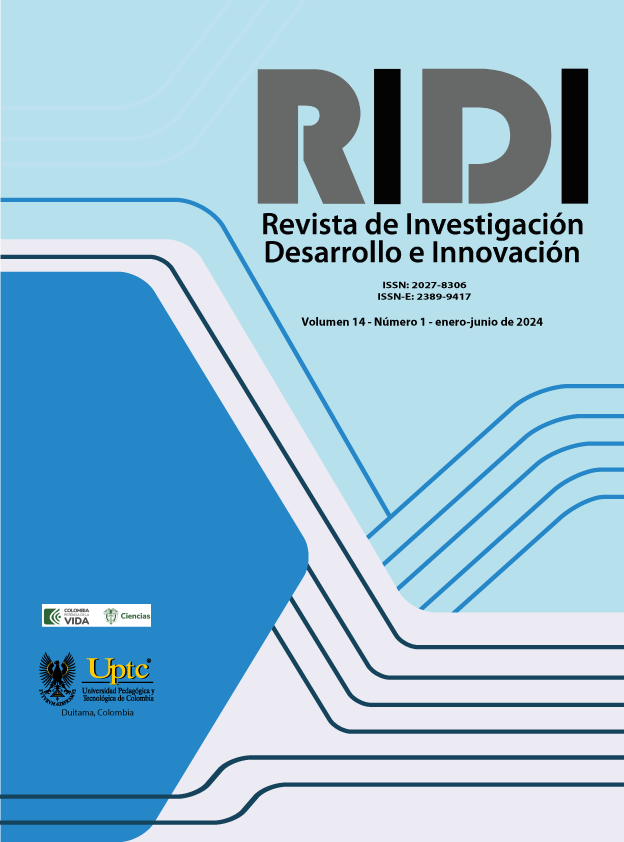Value chain in agroecological organizations: analysis from the triple bottom line

Abstract
The objective is to analyze organic farming as part of the bioeconomy, with emphasis on the triple base. The methodology is qualitative, using Participatory Action Research with agroecological producer communities in Tenjo and Tibacuy, Cundinamarca. In the economic dimension, it was found that producers use strategies such as barter, short circuits and the production of their own inputs. However, the lack of cost tracking and the absence of a consolidated brand are identified weaknesses. In the environmental dimension, the production of biological inputs and sustainable practices stands out, although the use of non-sustainable packaging is noted as a weakness. The lack of monitoring of the ecological footprint is identified as an aspect to be improved. In the social dimension, agroecology strengthens the community through barter, peasant markets and employment generation. However, lack of certification, limited participation in networks and low generational relay represent social challenges.
Keywords
agroecology, bioeconomy, sustainable value chain, triple base
Author Biography
Diana Marcela Díaz-Ariza
Economista, Magíster en Investigación de Problemas Sociales Contemporáneos
Estíbaliz Aguilar-Galeano
Bióloga, Magíster en Desarrollo Humano
References
- Alviar, M., García-Suaza, A., Ramírez-Gómez, L., & Villegas-Velásquez, S. (2021). Measuring the contribution of the bioeconomy: The case of Colombia and Antioquia. Sustainability (Switzerland), 13 (4), 1-26. https://doi.org/10.3390/su13042353 DOI: https://doi.org/10.3390/su13042353
- Aramendis, R. H., Rodríguez, A. G., & Krieger, L. F. (2018). Contribuciones a un gran impulso ambiental en América Latina y el Caribe: Bioeconomía. Santiago: Naciones Unidas-CEPAL. https://hdl.handle.net/11362/43825
- Birner, R. (2018). Bioeconomy Concepts. Bioeconomy: Shaping the Transition to a Sustainable, Biobased Economy, 17–38. https://doi.org/10.1007/978-3-319-68152-8_3 DOI: https://doi.org/10.1007/978-3-319-68152-8_3
- Braun, C. L., Bitsch, V., & Häring, A. M. (2021). Behind the scenes of a learning agri-food value chain: lessons from action research. Agriculture and Human Values 2021, 1, 1–16. https://doi.org/10.1007/S10460-021-10229-7 DOI: https://doi.org/10.1007/s10460-021-10229-7
- Cidón, C. F., Figueiró, P. S., & Schreiber, D. (2021). Benefits of Organic Agriculture under the Perspective of the Bioeconomy: A Systematic Review. Sustainability. 13 (12), 6852. https://doi.org/10.3390/SU13126852 DOI: https://doi.org/10.3390/su13126852
- Departamento Administrativo Nacional de Estadística, DANE. (2022). PIB por departamento. DANE. https://www.dane.gov.co/index.php/estadisticas-por-tema/cuentas-nacionales/cuentas-nacionales-departamentales
- Departamento Nacional de Planeación. (2018). Estudio sobre la bioeconomía como fuente de nuevas industrias basadas en el capital natural de Colombia. https://www.dnp.gov.co/Crecimiento-Verde/Documents/ejes-tematicos/Bioeconomia/informe%201/1-INFORME%20BIOECONOMIA%20FASE%201%20FINAL%2024012018.pdf
- Food and Agriculture Organization of the United Nations, FAO. (2014). Developing sustainable food value chains – Guiding principles. Roma. http://www.fao.org/3/a-i3953e.pdf
- Fien, J., & Guevara, R. (2013). Skills for a green economy: practice, possibilities and prospects. En Maclean et al. Skills development for inclusive and sustainable growth in developing Asia-Pacific. Springer: Dorchedt. https://doi.org/10.1007/978-94-007-5937-4 DOI: https://doi.org/10.1007/978-94-007-5937-4_14
- German, L., Bonanno, A., Foster, L. C., & Cotula, L. (2020). “Inclusive Business” in Agriculture: Evidence from the evolution of agricultural value chains. World Development, 134, 105018. https://doi.org/10.1016/j.worlddev.2020.105018 DOI: https://doi.org/10.1016/j.worlddev.2020.105018
- Global Bioeconomy Summit. (2018). Comunicado Cumbre Global de Bioeconomía 2018. https://gbs2018.com/fileadmin/gbs2018/Downloads/Communique%CC%81GBS2018_final_Spanish.pdf
- Hainzer, K., Best, T., & Brown, P. (2019). Local value chain interventions: a systematic review. Journal of Agribusiness in Developing and Emerging Economies, 9 (4), 369-390. https://doi.org/10.1108/JADEE-11-2018-0153 DOI: https://doi.org/10.1108/JADEE-11-2018-0153
- Hansika, S., & Wijerathna, M. (2021). Evaluation of Short Organic Food Supply Chains with Special Reference to Climate Smartness - The Case of Direct Farmers’ Market, Kurunegala, Sri Lanka. The Journal of Agricultural Sciences - Sri Lanka, 16 (2), 352-368. http://doi.org/10.4038/jas.v16i2.9340 DOI: https://doi.org/10.4038/jas.v16i2.9340
- Hassan, S. Z., Jajja, M. S., Asif, M., & Foster, G. (2020). Bringing more value to small farmers: a study of potato farmers in Pakistan. Management Decision, 59 (4), 829–857. https://doi.org/10.1108/MD-12-2018-1392 DOI: https://doi.org/10.1108/MD-12-2018-1392
- Jacobi, J., Wambugu, G., Ngutu, M., Augstburger, H., Mwangi, V., Zonta, A. L., Otieno, S., Kiteme, B. P., Burgoa, J. M., & Rist, S. (2019). Mapping Food Systems: A Participatory Research Tool Tested in Kenya and Bolivia. 39 (1), R1–R11. https://doi.org/10.1659/MRD-JOURNAL-D-18-00024.1 DOI: https://doi.org/10.1659/MRD-JOURNAL-D-18-00024.1
- Jose, A., & Shanmugam, P. V. (2019). Supply chain issues in SME food sector: a systematic review. Journal of Advances in Management Research, 17(1), 19–65. https://doi.org/10.1108/JAMR-02-2019-0010 DOI: https://doi.org/10.1108/JAMR-02-2019-0010
- Lanka, S., Khadaroo, I., & Böhm, S. (2017). Agroecology accounting: biodiversity and sustainable livelihoods from the margins. Accounting, Auditing & Accountability Journal, 30 (7), 1592-1613. https://doi.org/10.1108/AAAJ-12-2015-2363 DOI: https://doi.org/10.1108/AAAJ-12-2015-2363
- Marín, W., & Bustamante, C. (2018). Análisis del papel de la bioeconomía y los negocios verdes en el marco de los estudios transdisciplinares de análisis integral de los territorios, con énfasis en uso agropecuario y turismo de naturaleza. Bogotá: Instituto de Investigación de Recursos Biológicos Alexander von Humboldt.
- Mishra, P., & Dey, K. (2018). Governance of agricultural value chains: Coordination, control and safeguarding. Journal of Rural Studies, 135-147. https://doi.org/10.1016/j.jrurstud.2018.09.020 DOI: https://doi.org/10.1016/j.jrurstud.2018.09.020
- Mougenot, B., & Doussoulin, J. (2021). Conceptual evolution of the bioeconomy: A bibliometric analysis. Environment, Development and Sustainability. https://doi.org/10.1007/s10668-021-01481-2 DOI: https://doi.org/10.1007/s10668-021-01481-2
- Rajakal, J., Ng, D., Tan, R., Andiappan, V., & Wan, Y. (2021). Multi-objective expansion analysis for sustainable agro-industrial value chains based on profit, carbon and water footprint. Journal of Cleaner Production, 288. https://doi.org/10.1016/j.jclepro.2020.125117 DOI: https://doi.org/10.1016/j.jclepro.2020.125117
- Starobin, S. M. (2021). Credibility beyond compliance: Uncertified smallholders in sustainable food systems. Ecological Economics, 180. https://doi.org/10.1016/J.ECOLECON.2020.106767 DOI: https://doi.org/10.1016/j.ecolecon.2020.106767
- Vieira, L. M., Dutra, M., Barcellos, D., Hoppe, A., & Bitencourt, S. (2013). An analysis of value in an organic food supply chain. British Food Journal, 115 (10), 1454–1472. https://doi.org/10.1108/BFJ-06-2011-0160 DOI: https://doi.org/10.1108/BFJ-06-2011-0160
- Villanueva-Mejía, D. F. (2018). Modern biotechnology for agricultural development in Colombia. Ingeniería y Ciencia, 14 (28), 169-194. http://dx.doi.org/10.17230/ingciencia.14.27.7 DOI: https://doi.org/10.17230/ingciencia.14.28.7